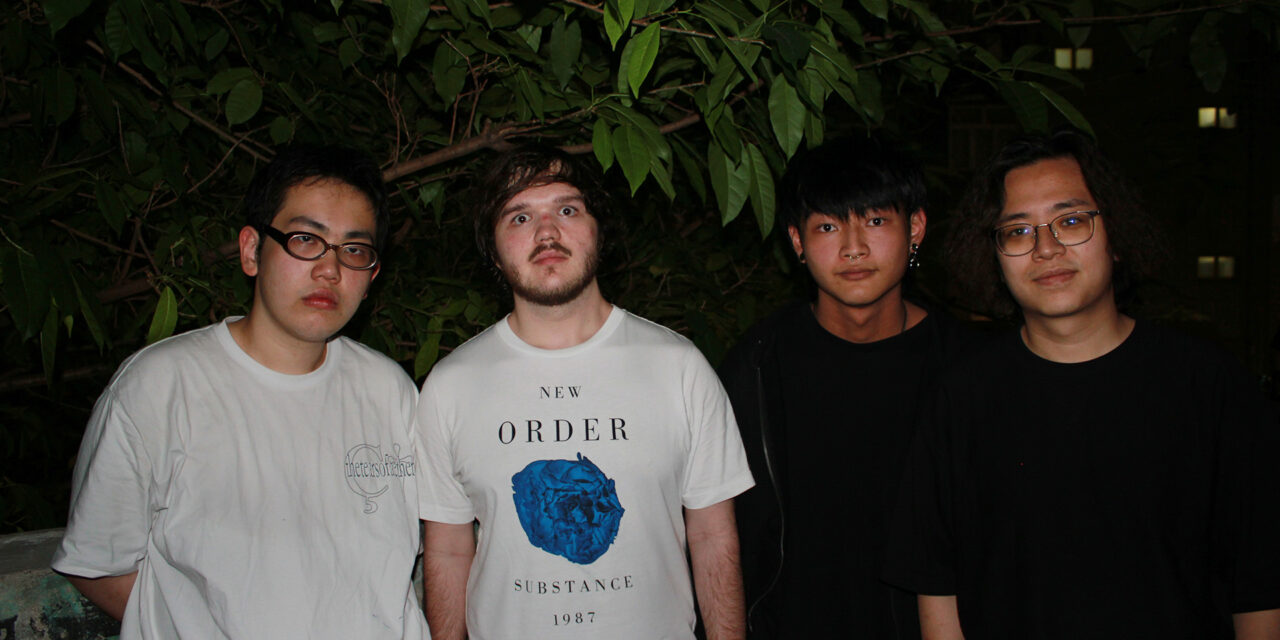By Jiaxin Lu
HKU Journalism and Media Studies Centre
“I could be a river, I sweep you away
Posit all my creatures at the grave where you lay”
This song had been playing on an endless loop in Rain’s headphones. It is called “Metamorphosis” by Rain’s favourite screamo band Your Arms Are My Cocoon from Chicago.
It was early April and within the confines of their university in Dongguan, Guangdong province, Rain, who only wanted to be identified by a pseudonym for privacy reasons, daydreamed about attending the band’s concert in Hong Kong. However, Rain hadn’t yet received a visa for Hong Kong, and the clock was ticking.
Born and raised in Dongguan, Rain, 19, had yet to experience the vibrant city across the border. Rain’s knowledge of Hong Kong was limited to the snippets gathered from Xiaohongshu (a Chinese version of Instagram), where tales of language barriers and payment difficulties encountered by mainland tourists are frequently shared.
However, Rain’s desire to attend the band’s concert in Hong Kong surpassed any apprehensions. Rain bought a prepaid virtual overseas bank card from Taobao in order to purchase the concert ticket, then had to pay for the visa fees and taxi and bus journeys. All added up, Rain spent HK$900 in personal savings, saved up through part-time work as an event photographer.
Rain’s parents knew of their child’s love for live music, but Rain didn’t dare tell them about how far the concert was. Rain’s parents had no idea what screamo – an alternative form of music featuring chaotic guitar playing and screaming vocals – was about, or what it meant to Rain. But the band’s music—a heavy sound with heavily emotional lyrics—made Rain cry. Rain saw that as a good thing.
“The music protects me,” Rain said, referring to negative emotions due to frustrations with the way things are.
Riding their luck
Less than eight hours before the show, as Rain was about to get lunch, the much-awaited visa came through. The visa application process typically takes 11 days, yet the application, filed 10 days ago, had been swiftly approved.
“As if the gods wanted to make this happen,” Rain said.A two-hour bus trip brought Rain from Dongguan to Hong Kong, to a windowless basement club. A blue neon sign outside read “Aftermath.” The scruffy venue was situated between the expensive restaurants of Wyndham Street and the clubs of Lan Kwai Fong, Hong Kong’s prime nightlife district. At a bar next door, sharply dressed financiers gathered around high round tables, indulging in post-work drinks.
That night, “Aftermath” manifested a more chaotic atmosphere than its name suggested. A war of sound was happening here – moshers flung themselves into a vibrational abyss, headbanging to the thunderous, bone-shaking riffs and piercing vocals.
Almost everyone there, about 60 people in total, were dressed in black.
Rain seamlessly blended in with the crowd. Sporting an oversized black T-shirt printed with the words “0% drugs, 0% violence, 0% gang, 100% love” in Times New Roman font, paired with a pleated plain skirt, Rain observed: “The venue was smaller than I had anticipated, but it brought people from different places together.”
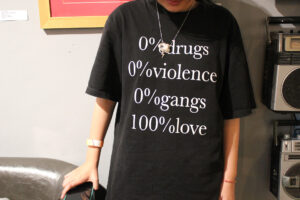
A medium shot frames Rain’s outfit, including a black t-shirt with the text “0% drugs, 0% violence, 0% gang, 100% love.” Rain wanted to keep her face out of the frame to remain anonymous. Photo by Lu Jiaxin.
‘I’m f*cking Gen-Z!’
While such an incongruous, and hardcore scene may appear ordinary in cities like New York or London, it is a rare sight in Hong Kong. Despite having a comparable population size of over 7 million people, the city’s underground music scene has been in steady decline.
COVID-19-era closures of live music venues have left individual artists within this niche music community with little space to perform or sustain their livelihoods. Traditional sport centres, while available, are clearly not suitable for underground music artists like Jeff Li, who are seeking to make their mark.
Li is the 19-year-old vocalist and founding member of The Tears of Tether, an up-and-coming screamo band that opened for Your Arms Are My Cocoon.
“It’s tough finding a place to perform, but we want to be the cool kids,” Li said, his words flowing effortlessly between English and Mandarin.
He spoke with a tranquil energy, yet his slightly raspy voice added a rebellious undertone. Music became Jeff’s outlet for expression following a heartbreak, a means to convey his vulnerability.
“I’m damn fragile! I’m damn emotional! I’m f*cking Gen-Z!” Li’s voice grew louder as he vehemently disagreed when asked about the notion that guys don’t discuss their feelings.
The answer was a resounding no.
Perched on a high stool near the bar, Li caught his breath and shared: “I think I might have sprained my ankle from all the jumping and stomping at the front row.”
His band shirt clung to his body, soaked with sweat.
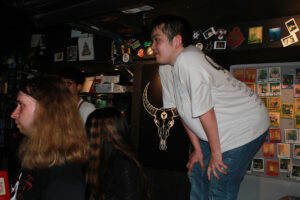
Jeff Li, founder of The Tears of Tether, an up-and-coming screamo band, stands at the back of the venue Aftermath. Photo by Lu Jiaxin.
The genesis of The Tears of Tether can be traced back to Li’s high school days in Shenzhen. As he transitioned to Hong Kong for college pursuing visual arts, he managed to connect with like-minded individuals through Facebook groups, gradually forming a band dedicated to creating music. Presently, the band consists of four members.
The night’s performance was their first time opening for a touring band.
Reclaiming vulnerability
In Hong Kong, they say the nights are long. The show was over, yet the room still simmered with the residual heat ignited by the music. Li and his band members ventured into the dimly lit alley, craving some fresh air.
There, amidst the aftermath of the sonic chaos, the shrill screeching sound of mice overpowered the lingering ringing sound that resonated in everyone’s ears.
Bassist Sebastien Streak’s damp fringe served as a tangible symbol of the physical and emotional release that accompanies loud, live music. In the darkness, the band was quiet, shy; perhaps coming down from the three-hour adrenaline surge that had drained their stamina battery to mere 10%. However, it didn’t take long for them to open up.

Bassist Sebastien Streak from The Tears of Tether, an up-and-coming screamo band that opened for the screamo band Your Arms Are My Cocoon, is surrounded by the crowd as the show ends. Photo by Lu Jiaxin.
“This genre of music allows us to embrace our vulnerability – it’s like an emotional catharsis,” said Streak. “A man can cry… It’s better to channel emotions through music than…”
“…jerking off in the confines of our bedrooms!” Li said, hijacking the conversation, eliciting laughter from everyone. In an uncommon display of energy, he continued to talk animatedly until his cigarette burned out.
Hendry Wong, the band’s typically reserved member, also found his voice. Adorned with a nose ring and an array of earrings, he explained why, in screamo, the music takes precedence over lyrics. “While lyrics play a significant role in mainstream music, we prefer a different approach,” he said.
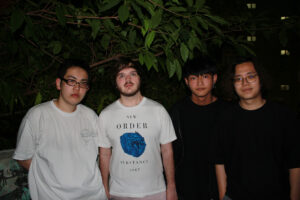
Members of The Tears of Tether, an up and coming screamo band, standing in the alley outside the venue Aftermath. From left to right, Jeff Li, Sebastien Streak, Hendry Wong, Ting Hei Wong. Photo by Lu Jiaxin.
As the band discussed the ever-evolving nature of musical identity, the event organiser shared similar views about steering away from mainstream conventions.
Adrianna Lee, the founder of gig promoter RICE, has a British accent that harmonises with her smoky, weathered voice, a juxtaposition to her petite figure. Her distinctive bleached eyebrows served as a visual statement in themselves.
After returning to Hong Kong from England, Adrianna longed for a vibrant music scene and, as a result, established RICE, a guerilla gig promoter.
“My intention was never to conform to mainstream standards like Clockenflap; I simply want to attract the right crowd,” she explained. “The culture itself is inherently anti-capitalist, but it encompasses all aspects of life. It can represent anything, really.”
Finding solace in screamotysm
Rain came to Hong Kong to be part of Lee’s crowd. Before the show, Rain had met up with two fellow screamo fans, also from Guangdong province. They were also hesitant to be identified.
They went by the pseudonyms Wenzi (meaning “mosquito” in Mandarin) and Dengdeng (meaning “wait” in Mandarin). They had initially connected with Rain through an online music group and had met Rain a few times before at different gigs in Guangzhou. As midnight approached and the club emptied out, the trio found themselves standing outside, at the back of Aftermath. Rain spoke first.
“I couldn’t help but shed tears when they began playing my favourite song, Metamorphosis,” Rain said.
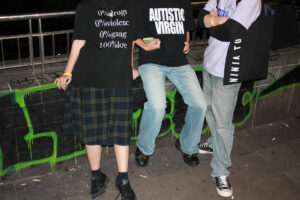
Rain, Dengdeng, and Wenzi, from left to right, stand in the alley at the back of Aftermath. Photo by Lu Jiaxin.
A gentle smile graced Rain’s face as words tumbled out: “I felt a sense of protection and security. In that particular moment, I was able to detach myself from the usually painful emotions I carry.”
Rain hurriedly continued: “I often find myself feeling utterly devastated… especially in the times of COVID.”
“I study social science, and when I saw the news, realising that I couldn’t do anything about the system I am in, I felt utterly devastated,” Rain repeated.
Dengdeng, leaning against the metal steel railing, nodded in agreement. He said that this genre of music is “great” for individuals who have endured suppression.
The phrase “AUTISTIC VIRGIN” was emblazoned on Dengdeng’s t-shirt. He proudly explained that this is how fans of Your Arms Are My Cocoon are affectionately referred to.
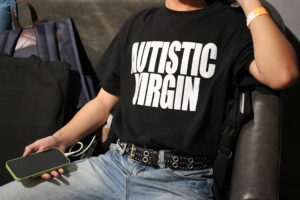
Dengdeng wears a t-shirt that identifies him as a fan of Your Tears Are My Cocoon. Photo by Lu Jiaxin.
Wenzi had remained silent throughout the conversation, observing quietly, until the moment he was asked to pose for a photo with Rain and Dengdeng. With a solemn expression, he said, “No, we’re different from you.”
He was referring to the political tension that had unfolded between mainland and Hong Kong residents, particularly since the wide protests in the city in 2019.
Dengdeng recounted an incident during the White Paper Movement in 2022 when many students in some cities in China held up pieces of white A4-size paper to show their frustration over long lasting and tough Covid-19 restrictions in the mainland.
He was “invited to drink tea” by the police (a euphemism for being summoned for questioning). He had printed out slogans that read “blocked lives matter” and affixed them to the red announcement board at his school.
“They told me, ‘You’re still in university—don’t engage in any political activities,'” Dengdeng recalled. “After the admonishment, I was released.”
After Dengdeng’s revelation, Wenzi seemed to ease up and began sharing his thoughts more openly. In contrast to his friend’s all-black style, Wenzi’s curly hair and glasses gave him the appearance of a character who has stepped out of an animated world. As a music producer himself, he expressed discontent with the restricted access to Virtual Private Network (VPN), which are used in mainland China to circumvent the firewall that blocks websites such as Google that the Chinese government blocks.
“Without VPN, we’re unaware of what’s happening beyond the Great Firewall, oblivious to the possibilities that lie beyond,” he said. “I firmly believe that everyone deserves the right to learn and explore.”
Rain nodded in agreement, and said they were shocked that some of their peers harboured genuine opposition to the concept of “ke xue shang wang,” a term commonly used to describe the use of the internet via VPN in China. Its literal meaning emphasises using the internet in a scientific manner.
“They simply believe that it’s unnecessary to venture beyond the confines of the Great Firewall, as life inside its boundaries is already pretty good,” Rain said.
While not as articulate as Rain, Wenzi appeared to carry a multitude of thoughts when discussing the limitations present in mainland China. He said: “For our generation, we don’t really have a concept of the country. We were compelled to view it as our mother; but in reality, we only have one true mother, our biological mother.”
Continuing a nocturnal odyssey
The midnight hour had come and gone, but the three-hour concert did not seem to deplete the trio’s energy. Unsure of their next move, as they couldn’t afford a hotel in Hong Kong, they grappled with their circumstances. Their only plan was to wander the streets of Hong Kong until it was time to catch the train the following morning.
As they reached the bustling heart of Lan Kwai Fong, Rain reached into a pocket and retrieved a pack of cigarettes worth HK$90 – a sum equivalent to the cost of the bus ride from Dongguan to Hong Kong.
Rain shared the smokes with Dengdeng and Wenzi. With a cigarette between each of their lips, the group strolled through down the hill towards the clubs.
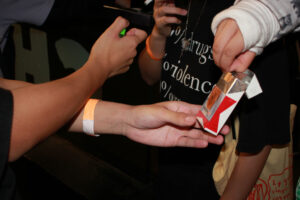
Dengdeng trying to help light up cigarettes for others. Photo by Lu Jiaxin.
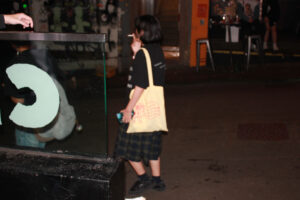
Rain smoking near the former LKF Tower in Lan Kwai Fong. Photo by Lu Jiaxin.
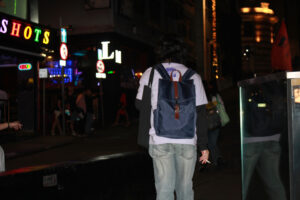
Wenzi holding a cigarette while walking near the former LKF Tower in Lan Kwai Fong. Photo by Lu Jiaxin.
However, they soon found themselves face-to-face with the local authorities under the unmistakable “Lan Kwai Fong” street sign. The motives behind the police stop remain unknown; perhaps it was the public smoking, or maybe it was Rain’s audaciously emblazoned shirt, adorned with bold, attention-grabbing letters spelling out “drugs” (despite the explicit disclaimer of “0% drugs”). Alternatively, it could have been their seemingly innocent yet subtly rebellious demeanor that caught the officers’ attention.
“I wasn’t particularly afraid of them… as long as they don’t fine me for money, that’s good,” Rain said, laughing, after the police checked their IDs and let them go.
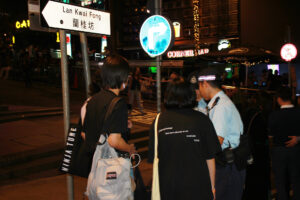
Police checking the identity documents of Wenzi, Dengdeng, and Rain near California Tower. Photo by Lu Jiaxin.
They continued to walk aimlessly around the Central area, retracing their steps from Aftermath. They wandered without a specific agenda, engaging in a guessing game as they passed various shops, attempting to deduce what the shops sell solely by observing the closed storefronts. Eventually, they found solace in a 24-hour McDonald’s.
“People in Hong Kong are surprisingly friendly! An elderly man even taught me how to use the payment system to place my order,” Rain said.
The next morning, Rain boarded the morning train and arrived in class at 10:30 am, exactly five minutes before the start.
“I can’t quite recall the exact course, but it might have been on Mao Zedong Thought,” Rain said, six weeks after the trip to Hong Kong. “However, I always find myself pondering that night; time felt very vague… as if I was in another space.”
Advisor: Jennifer Deayton

